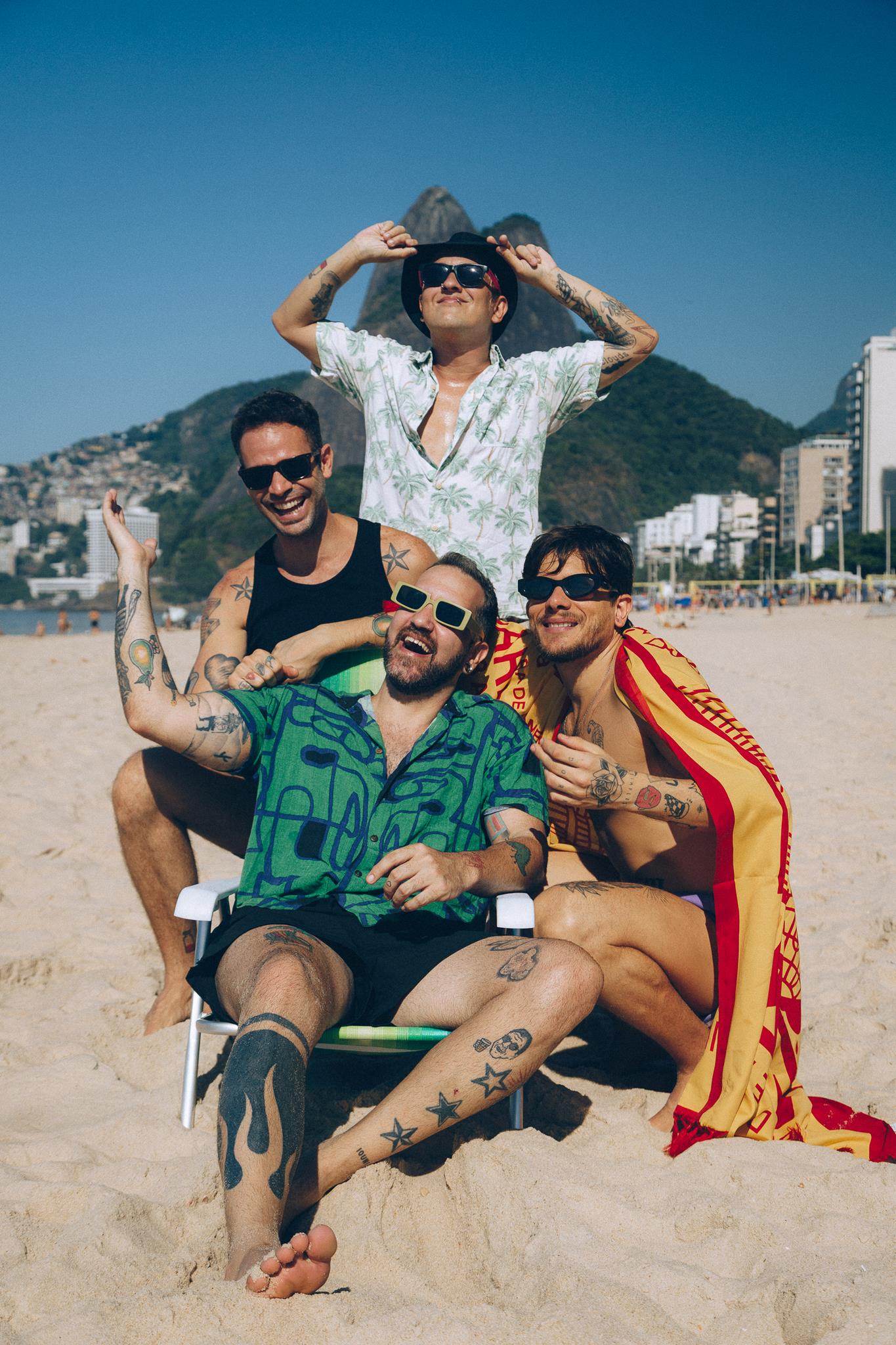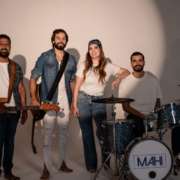
The irreverence of punk and hardcore gains new layers in “Empacotado,” the new album by Rio de Janeiro band Meu Funeral , released on September 19th on all platforms by Marã Música. Composed of Luquita (vocals and guitar), Dan (bass), Pepe (guitar and backing vocals), and Tent (drums and choreography), the work blends humor, existentialism, everyday critiques, and sonic experimentation that create a “strangely wonderful” atmosphere, according to the members. The album, which features Duda Beat and is produced by Tomás Tróia, reaffirms the group as one of the most creative names in Brazilian rock today. It also features a music video for the track “Velho Pra Sempre,” which emphasizes the contrast between the fast-paced music and the slow-paced images.
“Empacotado” is described as an album that moves between humor, chaos, and experimentation. If you could summarize this work in a single image or metaphor, what would it be?
The height of a birthday party with lots of guests can be a beautiful image. There’s always someone very happy, someone fighting, someone feeling sick, that crazy person who decides to have coffee at 2 a.m…. It’s all there in a somewhat chaotic and spontaneous way.
Some songs are over ten years old, and others were created minutes before recording. What was it like balancing these very different phases of your lives on the same album?
It was a very different experience when it came to selecting the repertoire. The choices were very casual, an almost irresponsible process. We’d wake up, have coffee, and say, “So, what are we recording today?” We’d choose a finished song, a semi-finished song, or an idea and work on it. On other albums, we’d take 20 or 30 demos and choose which ones to work on before starting the recording process. So Empacotado was very much a portrait of that specific day when we made the decision to record that particular song. It gradually took on the feel of a record throughout the recording process, and in the end, it felt like an album, with a sonic diversity that perfectly represents what Meu Funeral is today.

You’ve said that this album is “less funny” than the last, even though it still carries irony. At what point did you feel you wanted to explore a more profound or reflective side to your lyrics?
I don’t know if there was a specific moment. We’ve always had our moments of being serious, too, so perhaps due to the repertoire selection process, we ended up opting for some less comedic songs, but the band’s essence and identity are very present in this new release. Speaking like that, it might seem like we’re becoming as serious as Dead Fish, but it’s not really like that. I think “Café” is the funniest song we’ve ever written. “Tudo Que Eu Queria” isn’t a song I’d call serious either, but in fact, there are some less funny things overall.
The sound blends layers of punk, hardcore, pop, and Brazilian influences. How did you come to the point where you said, “This mix makes sense, this is Meu Funeral”?
I feel like the band’s identity is largely built on what we’re listening to at any given moment. So we try to incorporate other musical styles without forcing it, working to make this mix meaningful and a further piece in building the band’s identity. We grew up listening to bands that mix things up without losing their identity, like Planet Hemp and Charlie Brown, so I think we draw from these sources when creating our mixes, but we try to do it our own way.

The composition and recording process involved a lot of experimentation. What was the most unexpected or unusual experience that happened in the studio during this production?
During the post-production process at Tomás Tróia’s house, we’d open a song and go crazy with the little noises. I remember he’d show me some stuff before it was released, and one of those times he showed me “Sem Dormir” by Cícero featuring Duda Beat, which has a really cool instrumental part at the end. I thought it was so cool that I suggested we do something similar with one of our songs, and he was totally up for it! And that’s how the ending of “Orgulho de Ser Burro” came about, which was a mix of Turnstile and Stranger Things (laughs). Another interesting fact is that “Leite com Manga” was recorded during the recording session that gave rise to Modo Fufu (our first album), with Jorge Guerreiro, and I remember that while we were recording, we used as many instruments and pedals as we could. So there’s a country guitar, a Moog, a guitar with “Metal Zone” (the pedal that every metalhead knows), an ebow to create infinite sustain with the guitar, and we even use Bic pens as percussion instruments.
You mention that “Empacotado” should work both on headphones and at a packed show. How do you think about the relationship between the audience and your sound when creating your songs?
We usually work on songs very freely. I think this whole thing of meeting audience expectations can be a big trap. We like to experiment so we don’t repeat ourselves, but at the same time, we try to maintain an identity. The “expansion” of our identity has been like this: our first EP was punk and hardcore with a ska strayed in the middle. Then we mixed it with funk and it worked, so we thought, “Hey! We can do rock with funk too.” With pagode, it was the same. Now with synth pop, and so we’re stretching the envelope. As for the songs working at a packed show, I think it has a lot to do with the fact that punk rock is in our DNA and is the common thread of these mixes; so, regardless of the sound we’re making, the chaotic and pulsating energy ends up being present.

Duda Beat’s participation brings a new flavor to the band’s sonic universe. What was the collaboration like, and what did it add to the final result?
Tomás Troia, Duda’s husband, did the post-production for Empacotado at their house. So we were together quite often; she’s always been a sweetheart. She’s always been very welcoming, so during a chat in their kitchen, I extended the invitation, and she immediately accepted. I was a bit impressed because she arrived at the studio in slippers, dressed for her home (because he was actually at home, but it’s unusual for someone used to seeing her super dressed up on giant stages) and absolutely nailed it on the first take. She improvised vocals while recording and came up with the lyrics on the spot. It was beautiful. We are very grateful for the welcome and generosity of both Duda and Troia.
For those who are going to listen to “Empacacotado” for the first time, which track would you recommend as the perfect gateway to understanding what Meu Funeral is about today?
Controversial question! But I think the gateway could be “Velho Pra Sempre,” which opens the album. Then, if you like it, stay a little longer and listen to “Não Sei Me Despedir.” Then, since you’re a polite person, you stick with “Café,” which is the next track and is short… Before you know it, the album is over and you’re playing it again.
Follow My Funeral on Instagram


